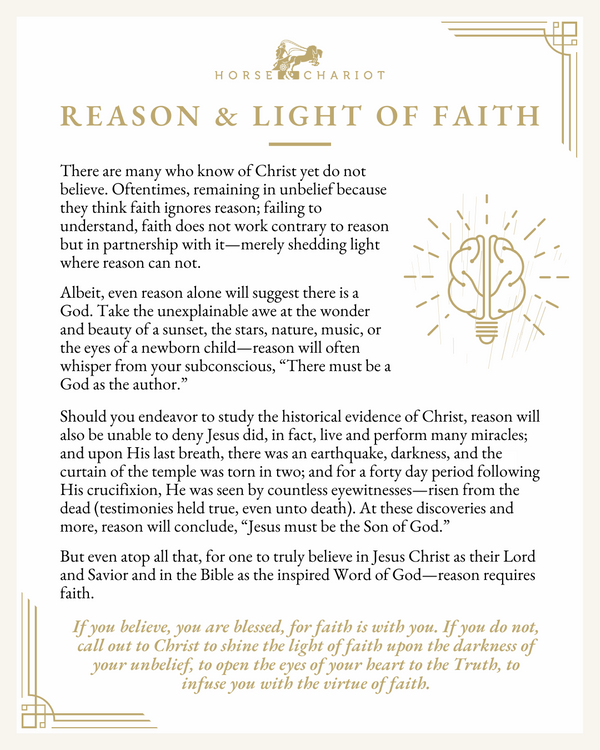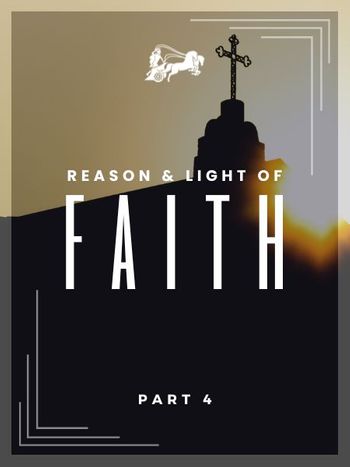All Series > Virtue of Faith > Part 4
Reason and Light of Faith
Teaching of Virtue
Watch: On YouTube
Reason & Light of Faith
There are many who know of Christ yet do not believe. Oftentimes, remaining in unbelief because they think faith ignores reason; failing to understand, faith does not work contrary to reason but in partnership with it—merely shedding light where reason can not.
Albeit, even reason alone will suggest there is a God. Take the unexplainable awe at the wonder and beauty of a sunset, the stars, nature, music, or the eyes of a newborn child—reason will often whisper from your subconscious, “There must be a God as the author.”
Should you endeavor to study the historical evidence of Christ, reason will also be unable to deny Jesus did, in fact, live and perform many miracles; and upon His last breath, there was an earthquake, darkness, and the curtain of the temple was torn in two; and for a forty day period following His crucifixion, He was seen by countless eyewitnesses—risen from the dead (testimonies held true, even unto death). At these discoveries and more, reason will conclude, “Jesus must be the Son of God.”
But even atop all that, for one to truly believe in Jesus Christ as their Lord and Savior and in the Bible as the inspired Word of God—reason requires faith.
If you believe, you are blessed, for faith is with you. If you do not, call out to Christ to shine the light of faith upon the darkness of your unbelief, to open the eyes of your heart to the Truth, to infuse you with the virtue of faith.

Scroll down for the related scriptures, quotes, and lesson plan associated with this teaching.
Copyright © 2022 Horse & Chariot. All rights reserved.
Visual Resource

Related Scripture
“Have you not known? Have you not heard? The Lord is the everlasting God, the Creator of the ends of the earth. He does not faint or grow weary; his understanding is unsearchable.” —Isaiah 40:28 (NRSVCE)
“proclaim the word; be persistent whether it is convenient or inconvenient; convince, reprimand, encourage through all patience and teaching. For the time will come when people will not tolerate sound doctrine but, following their own desires and insatiable curiosity, will accumulate teachers and will stop listening to the truth and will be diverted to myths." — 2 Timothy 4:2-4 (NABRE)
“In the beginning was the Word, and the Word was with God, and the Word was God. He was in the beginning with God. All things came into being through him, and without him not one thing came into being. What has come into being in him was life, and the life was the light of all people.” — John 1:1-4 (NRSVCE)
“...think of the Lord in goodness, and seek him in integrity of heart; Because he is found by those who do not test him, and manifests himself to those who do not disbelieve him.” — Wisdom 1:1-2 (NABRE)
“Then Jesus said to her, ‘Did I not tell you that if you believe, you will see the glory of God?’” — John 11:40 (NRSVCE)
“He who lives forever created the whole universe; the Lord alone is just. To none has he given power to proclaim his works; and who can search out his mighty deeds? Who can measure his majestic power? And who can fully recount his mercies? It is not possible to diminish or increase them, nor is it possible to fathom the wonders of the Lord. When human beings have finished, they are just beginning, and when they stop, they are still perplexed. What are human beings, and of what use are they? What is good in them, and what is evil? The number of days in their life is great if they reach one hundred years. Like a drop of water from the sea and a grain of sand, so are a few years among the days of eternity. That is why the Lord is patient with them and pours out his mercy upon them. He sees and recognizes that their end is miserable; therefore he grants them forgiveness all the more. The compassion of human beings is for their neighbors, but the compassion of the Lord is for every living thing. He rebukes and trains and teaches them, and turns them back, as a shepherd his flock. He has compassion on those who accept his discipline and who are eager for his precepts.” — Sirach 18:1-14 (NRSVCE)
“Ever since God created the world, his invisible qualities, both his eternal power and his divine nature, have been clearly seen; they are perceived in the things that God has made. So those people have no excuse at all!” — Romans 1:20 (GNT)
“For we fix our attention, not on things that are seen, but on things that are unseen. What can be seen lasts only for a time, but what cannot be seen lasts forever.” — 2 Corinthians 4:18 (GNT)
“By faith, we understand that the worlds were prepared by the word of God, so that what is seen was made from things that are not visible.” — Hebrews 11:3 (NRSVCE)
“Now faith is the assurance of things hoped for, the conviction of things not seen. Indeed, by faith our ancestors received approval. By faith we understand that the worlds were prepared by the word of God, so that what is seen was made from things that are not visible.” — Hebrews 11:1-3 (NRSVCE)
Related Quotes
“The ultimate purpose of reason is to bring us to the place where we can see that there is a limit to reason.” — Blaise Pascal
“We can’t have full knowledge all at once. We must start by believing; then afterward we may be led on to master the evidence for ourselves.” — St. Thomas Aquinas
“If you believe what you like in the gospels, and reject what you don’t like, it is not the gospel you believe, but yourself.” — St. Augustine
“Seek not to understand that you may believe, but believe that you may understand.” — St. Augustine
“The problem of disbelieving in God is not that a man ends up believing nothing. Alas, it is much worse. He ends up believing anything.” — Gilbert K. Chesterton
“Take the first step in faith. You don’t have to see the whole staircase, just take the first step.” — Martin Luther King Jr.
“For our part, we find it far more easy to believe that the Lord made us than that we were developed by a long chain of natural selections from floating atoms which fashioned themselves.” — C.H. Spurgeon
“As the flower in the garden stretches toward the light of the sun, so there is in the child a mysterious inclination toward the eternal light. Have you ever noticed this mysterious thing that when you tell the smallest child about God, [he or she] never asks with strangeness and wonder, ‘What or who is God – I have never seen Him,’ but listens with shining face to the words as though they soft loving sounds from the land of home. Or when you teach a child to fold [his or her] little hands in prayer that [he or she] does this as though it were a matter of course, as though [it was] opening for [the child] that world of which [he or she] had been dreaming with longing and anticipation. Or tell them, these little ones, the stories of the Savior, show them the pictures with scenes and personages of the Bible – how their pure eyes shine, how their little hearts beat.” — R.C.H. Lenski
“But someone will say, ‘Didn’t Jesus say that, to be saved, you have to be as a little child?’ Of course he did. But did you ever see a little child who didn’t ask questions? People who use this argument must never have listened to a little child or been one. My four children gave me a harder time with their endless flow of questions than university people ever have… What Jesus was talking about is that the little child, when he has an adequate answer, accepts the answer. He has the simplicity of not having a built-in grid whereby, regardless of the validity of the answer, he rejects it.” — Francis Schaeffer
“These are His ways, unfathomable and incomprehensible to us. It is for us to submit ourselves completely to His holy will. There are mysteries that the human mind will never fathom here on earth; eternity will reveal them.” — St. Maria Faustina Kowalska
“Faith is to believe what you do not see; the reward of this faith is to see what you believe.” — St. Augustine
“Sometimes people believe in little or nothing, and so they give their lives to little or nothing.” — St. Joan of Arc.
“In faith, there is enough light for those who want to believe and enough shadows to blind those who don’t.” — Blaise Pascal
“I believe in Christianity as I believe that the sun has risen: not only because I see it, but because by it I see everything else.” — C. S. Lewis
“Faith is like a bright ray of sunlight. It enables us to see God in all things as well as all things in God.” — St. Francis de Sales
“Faith consists in believing when it is beyond the power of reason to believe.” — Voltaire
“Faith, in the sense in which I am here using the word, is the art of holding on to things your reason has once accepted, in spite of your changing moods.” — C.S. Lewis
“Any faith that must be supported by the evidence of the senses is not real faith.” — A.W. Tozer
“All I have seen teaches me to trust the Creator for all I have not seen.” — Ralph Waldo Emerson
“To one who has faith, no explanation is necessary. To one without faith, no explanation is possible.” — St. Thomas Aquinas
“Faith is different from proof; the latter is human, the former is a Gift from God.” — Blaise Pascal
“Faith is a higher faculty than reason.” — H. C. Bailey

Lesson Plan
For your family, small group, or personal reflection.
STEP 1: Introduction
Example: "I'm going to play a short video on the topic of reason and light of faith. After the video, I have some questions to gather your thoughts and get the discussion started. We’ll then wrap up with a closing prayer."
STEP 2: Watch Video (or listen)
Watch (or listen to) the video of the teaching (cast to your TV via YouTube). If time allows, also read the teaching, related Scriptures, and related quotes.
STEP 3: Discussion / Reflection
- Faith does not work contrary to reason, but in partnership with it—merely shedding light where reason can not. What does this mean to you?
- What are moments or examples in your life where reason alone suggests there is a God?
- Have you studied the historical evidence of Christ? If so, please share.
- Many of Christ’s followers were put to death for standing behind their claim of His life and resurrection. Reason tells us they would not have held their claim to brutal death unless it was absolutely and profoundly true. For example, Peter the Apostle not only held to the truth but requested to be crucified upside down, as he felt unworthy to die in the same manner as Christ. What are your thoughts on this?
- To truly, fully, deeply, and undoubtedly believe in Jesus Christ as the Lord and Savior and in the Bible as the inspired Word of God—reason requires faith. What does this mean to you? Do you truly, fully, deeply, and undoubtedly believe?
- Did any of the related Scriptures or quotes stand out to you (please elaborate)?
- Any other thoughts you’d like to share?
STEP 4: Wrap Up & Closing Prayer
Summarize and wrap up the discussion. Then, conclude with a sincere and humble prayer from the heart.

Join one of our free online training events.
Shop all our teachings of virtue prints.
Explore other virtue-based products.
Never miss a teaching — get all new teachings of virtue sent to your inbox free!



